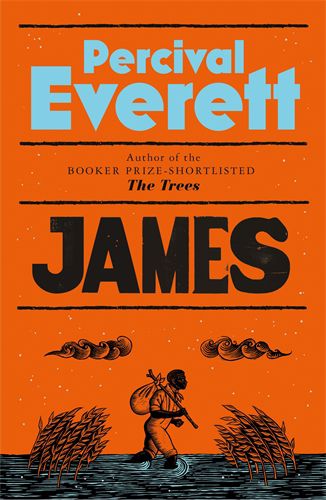Readings Newsletter
Become a Readings Member to make your shopping experience even easier.
Sign in or sign up for free!
You’re not far away from qualifying for FREE standard shipping within Australia
You’ve qualified for FREE standard shipping within Australia
The cart is loading…






Winner of the 2024 National Book Award for Fiction
Shortlisted for the Booker Prize 2024
James is an enthralling and ferociously funny novel that leaves an indelible mark, forcing us to see Mark Twain's The Adventures of Huckleberry Finn in a wholly new and transformative light.
The Mississippi River, 1861. When the enslaved Jim overhears that he is about to be sold to a new owner in New Orleans and separated from his wife and daughter forever, he decides to hide on nearby Jackson's Island until he can formulate a plan. Meanwhile, Huck Finn has faked his own death to escape his violent father who recently returned to town.
Thus begins a dangerous and transcendent journey by raft along the Mississippi River, toward the elusive promise of free states and beyond. As James and Huck begin to navigate the treacherous waters, each bend in the river holds the promise of both salvation and demise.
With rumours of a brewing war, James must face the burden he carries: the family he is desperate to protect and the constant lie he must live. And together, the unlikely pair must face the most dangerous odyssey of them all . . .
From the shadows of Huck Finn's mischievous spirit, Jim emerges to reclaim his voice, defying the conventions that have consigned him to the margins.
$9.00 standard shipping within Australia
FREE standard shipping within Australia for orders over $100.00
Express & International shipping calculated at checkout
Winner of the 2024 National Book Award for Fiction
Shortlisted for the Booker Prize 2024
James is an enthralling and ferociously funny novel that leaves an indelible mark, forcing us to see Mark Twain's The Adventures of Huckleberry Finn in a wholly new and transformative light.
The Mississippi River, 1861. When the enslaved Jim overhears that he is about to be sold to a new owner in New Orleans and separated from his wife and daughter forever, he decides to hide on nearby Jackson's Island until he can formulate a plan. Meanwhile, Huck Finn has faked his own death to escape his violent father who recently returned to town.
Thus begins a dangerous and transcendent journey by raft along the Mississippi River, toward the elusive promise of free states and beyond. As James and Huck begin to navigate the treacherous waters, each bend in the river holds the promise of both salvation and demise.
With rumours of a brewing war, James must face the burden he carries: the family he is desperate to protect and the constant lie he must live. And together, the unlikely pair must face the most dangerous odyssey of them all . . .
From the shadows of Huck Finn's mischievous spirit, Jim emerges to reclaim his voice, defying the conventions that have consigned him to the margins.
See what the Readings’ team have to say on the blog, discover related events and podcast episodes.
Percival Everett is the author of over thirty published works, including Zulus, Erasure, I Am Not Sidney Poitier, Assumption, Percival Everett by Virgil Russell, Telephone, The Trees, Dr. No and James. A Guggenheim Fellow and Pulitzer Prize Finalist, Everett has won the PEN Oakland/Josephine Miles Literary Award, the Academy Award in Literature, the Bollinger Everyman Wodehouse Prize for Comic Fiction, and the Windham-Campbell Literature Prize for Fiction. In 2022, The Trees was shortlisted for the Booker Prize. Percival Everett lives in Los Angeles, CA, where he is Distinguished Professor of English at the University of Southern California.